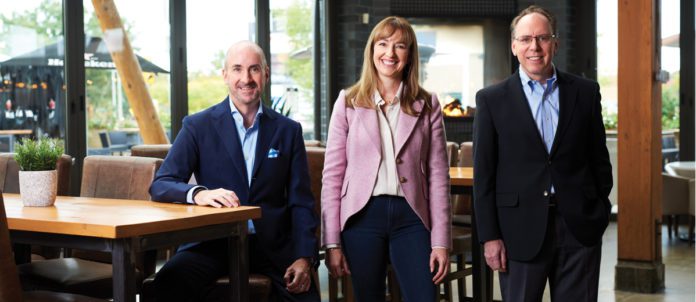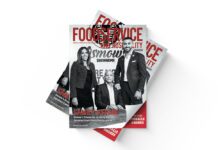
When Frank Hennessey returned to Recipe Unlimited as Chief Executive Officer three years ago, he recognized an opportunity to shape the future of the industry. “The main driver for me coming back was to change the way chain restaurants operated into the future.”
Change is nothing unusual for a company that was founded in 1883 as The Canada Railway News Company, and later re-named CARA Operations. Today, Recipe operates more than 1,300 restaurants in more than 300 communities in Canada, as well as 61 international locations.
Recipe owns and operates some of the country’s most iconic brands, including Swiss Chalet, St-Hubert and Keg Restaurants. It continues to look for complementary brands to round out its ever-evolving portfolio, as well as launching new brands such as its Ultimate Kitchen (Malgam in Quebec). The multi-brand takeout-and-delivery concept was launched in 2019, and has just opened its fifth location. This alternative channel allows customers to get more choices via a single delivery service and reach more guests in downtown urban centres where finding locations to build is cost prohibitive, explains Hennessey.
“We mix and match brands inside the kitchens to fit the area,” explains Hennessey. “They also provide a test centre for us for equipment and technology. We intend to build these in strategic areas to complement rather than replace our existing brick-and-mortar locations and have signed for two new locations in the GTA.”
Even if you go back to the origins of the company, it has always evolved with the times, he says. That evolution has accelerated with the rise in technology adoption and the profound impact the pandemic has had on the industry.
“We were well down the e-commerce path since 2014 because we had two very large businesses that did off-premise service,” explains Hennessey.
Recipe’s all encompassing in-house technology platform provides the ability to manage an industry that is more complex than ever before, he adds. “Because there are so many different channels of business inside one restaurant, the economics, staffing, average check and other key parameters are different. Swiss Chalet, for example, has 10 different channels of business with its own economic models.”
Hennessey stresses that technology is just one part of the success equation. “It makes it simpler to operate business, but you can’t forget the reasons why guests come to our restaurants in the first place, which are the food, the value, the experience and the ambiance.”
Throughout the pandemic, Recipe has been at the forefront of change, from supporting its people development and team support, to community outreach and sustainability.
People development has been designated a top priority at Recipe. It’s RU Leading and RU Game platforms engaged more than 19,000 learners and has set a target to have 50 per cent of the leadership team from diverse backgrounds by 2025. “We intend to continue to grow as a company so we need plenty of leaders,” says Hennessey. “One thing we’ve learned is you can’t open front doors if you don’t have great people.”
Beyond training, Recipe has made every effort to keep teammates engaged, healthy and connected throughout the challenges of the past 20 months. Its Well and Good employee-wellness program helps teammates continue to engage and connect with each other, celebrate peers and join events. “We also provide access to mental-health resources,” says Hennessey.
Other initiatives include extending its benefits program to cover paid sick days and personal wellness days. “We also paid over $1 million in Thank You Pay, as well as a relief package for the frontline teammates, tripling our original commitment to help bridge the down time,” he notes. “All these things ensure people know we’re there to help them, not just financially, but mentally and emotionally as well.”
At the same time, and with the support of Health Canada and the Ministry of Health for the Province of Ontario, Recipe began offering antigen rapid tests across its restaurants in Ontario. The program has since expanded to cover all Recipe locations across the country.
In the past year, Recipe committed more than $40 million in support to franchise partners. It donated more than $2.28 million, including 158,543 meals, to people impacted by COVID-19, as well as donated more than $450,000 worth of surplus food from COVID-19- related closures.
Recipe also partners with Boys and Girls Clubs of Canada to provide kids across the country with the skills and support they need to become productive members of their communities.
This year, the company released its inaugural Corporate Sustainability Report (CSR), an annual document that puts a stake in the ground for the future direction of the company. “This is just a starting point,” says Hennessey. “The CSR is great, but it’s the metrics and actions we take that really matter and will make us a dynamic leader in the industry.”
Over the past two years its ‘Recipe for Sustainability’ has been focused on reducing energy and water consumption by 15 per cent. Recipe is also working with brands and suppliers to complete 16 initiatives focused on sustainable packaging, says Hennessey. “These have allowed us to ensure that 99.7 per cent of our packaging is per- and polyfluoroalkyl substances free; and 90 per cent of guest packaging is made from renewables, recyclable or recycled sources.”
Working with producers and suppliers, Recipe now uses only cage-free eggs, and is on the Canadian Roundtable for Sustainable Beef (CRSB). By the end of 2022, all seafood served in its restaurants will be third-party certified, he reports.
One important issue COVID-19 brought to the forefront is the need for a strong central organization to champion its causes, says Hennessey. “We now realize how fractured our industry is. Everyone has been put under enormous stress to the point where some broke. Those are things we have to examine and address. We must find a way to have stronger associations so chains, independents and supplier partners can more actively work together and our voices can be heard by government at all levels.”
As for the future, he says there will be more acquisitions in the mix. “We’re always looking at how to get our portfolio right. We have two paths: large and dominant brands that own their sector, and younger brands like The Burger’s Priest and Fresh that offer a long runway of growth with today’s consumers. Grocery is another channel we will continue to develop. And we’re not shy to operate restaurants in the U.S. Acquisition will always be part of our strategy, and geographic expansion is part of that.
”When asked what he is looking forward to most in the coming months, he says it’s re-connecting personally with teammates and partners. “I’m really looking forward to talking to everyone about how we can come together and try to change the trajectory of the industry and how we can create a better [industry] that more people want to voluntarily join. There’s a lot of work that needs to be done there.”
By Denise Deveau | Photography by Daniel Alexander


















